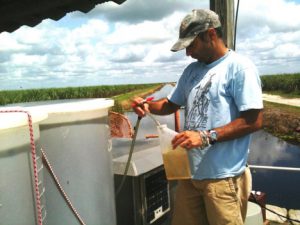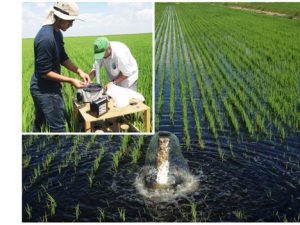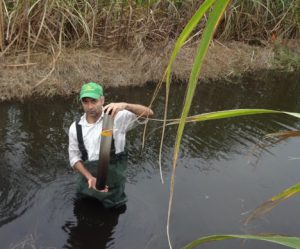Jessica Southard Pardo, Communication Specialist, SWS
Jehangir Bhadha, Assistant Professor, SWS
Dr. Jehangir Bhadha joined SWS as an Assistant Professor of Nutrient Management at the Everglades Research and Education Center (EREC) in Belle Glade, Florida. His research priorities are in the field of water quality, soil sustainability and sustainable agriculture. Bhadha received a B.S. from St. Xavier’s College, Mumbai, India, MS degree from UF (Geological Sciences) and PhD from the UF Soil and Water Sciences Department. Bhadha served two postdoctoral assignments, one in Gainesville and another at the EREC. In 2013 he was appointed as an Assistant Research Scientist at EREC, to conduct research on developing Best Management Practices to reduce phosphorus loads from farm canals in the Everglades Agricultural Area.
In an effort to get to know Dr. Bhadha more personally, I asked him a few questions.

At what point in your life did you know that you wanted to be a soil scientist?
During my undergraduate program (Bachelor of Science) at St. Xavier’s College in Bombay, India, I was faced with the decision of either majoring in Physics, Economics or Geology (Earth Sciences). Besides the fact that I would score good grades in Geology, what motivated me to major in it was the “fieldwork” component. I thoroughly enjoyed going on fieldtrips to remote parts of India collecting bags of rocks that weighed heavier than me, identifying the minerals with a hand lens and ultimately being able to map the geologic sequences. Ever since then, there was no doubt in my mind that I wanted to pursue a career that would involve fieldwork, whether it be soil, water or agricultural sciences.
What led to your move to UF?
Back in 1999-2000 there really was not much career option for Geology majors in India. And even fewer options for applied geology, which is what I wanted to pursue. So in 2000 I decided to apply to US schools to be enrolled in a Master’s program. UF was one of three offers I had to choose from. I chose UF simply because of its location; close to the beaches, and hot weather. I also had a colleague from Xavier’s college enrolled at UF’s Geology Department at that time, and his presence gave me added reassurance to move to Florida.

What are you most excited about as a new UF/IFAS faculty member?
Being a new faculty member I am most excited about mentoring graduate students. Assist them to develop their ideas into research projects. Helping them understand the finer points of doing scientific research, at the same time being academically competitive. I am also excited about working on new projects, and making new discoveries.
What is your vision for the Everglades REC and its impact on the Florida Everglades?
I envision good things coming out of Everglades REC in the future. Over the past few years, the number of graduate students affiliated with the EREC has increased, and so has the number of faculty and staff. I envision more emphasis on integrated research which will allow faculty and students to compete for grant opportunities that would have otherwise not existed. The Florida Everglades is directly impacted by the work being conducted within the EREC and the Everglades Agricultural Area. Water quantity and quality are two major areas of research that can have a direct impact on the Everglades and these issues are being addressed by the researchers, growers and regulators. By promoting concepts of sustainable agricultural practices in the EAA I hope for growers to continue farming for future generations, and improve the quality of our surrounding natural ecosystems.

What part of your research are you most proud of?
I have always been proud of the applied aspect of all my research project undertakings. Also, I have always been proud of the way in which we approach a research project. Being able to conceptualize a solution to a problem is what I get most excited about. It is very fulfilling to me to take time at the start of any project to do a thorough literature review so as to understand the constraints and limitations of any system. And lastly, I am proud of being able to take chances, trying something different, “thinking outside the box” so to speak.
What do you foresee as being the biggest challenge for the Everglades?
I foresee changes in climatic patterns as the biggest challenge for the Everglades. Prolonged droughts during the summer months and wet winters can significantly affect water management and quality in south Florida. In addition, there is also the threat of sea-level rise, and increase in salinity could cause major shifts in ecosystem balances.
Do you have any exciting projects or collaborations underway?
I would like to think all my projects/collaborations are exciting. At the moment, I have a couple of projects that I am thrilled about. One of them is trying to test the feasibility of using aquatic vegetation as biofilters to reduce nutrient loads in farm canals. The other is to start a biochar initiative that utilizes organic feedstocks as soil amendment to grow vegetables, particularly on depleted sandy soils. I have also been looking at the cultural and environmental benefits of cultivating flooded rice in the Everglades Agricultural Area. Most of my projects tend to entail grower collaboration in some form or another. Next summer I wish to organize a half day training for local rice growers that will help us integrate ideas and ultimately improve yields.
What motivates you most to go to work every day?
My colleagues are my biggest motivation to go to work every day, this includes fellow professors, students, interns, and staff. I have gotten to know most of them personally and they are always there to help me whenever I needed it, professionally or otherwise.
Where/how did you get the nickname Jango?
My birth name is Jehangir (meaning conqueror of the world in Persian), who was a famous Moghul emperor. My parents would call me ‘Jangu’ while I was growing up in India. At the age of 17 when I joined college my friends decided to drop the ‘u’ and replace it with an ‘o’; and ever since I have the nickname ‘Jango’. Although my parents still use ‘Jangu’.
 0
0
